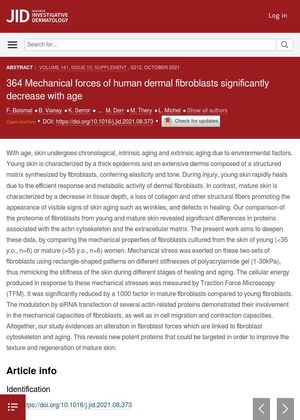Mechanical Forces of Human Dermal Fibroblasts Significantly Decrease with Age
October 2021
in “
Journal of Investigative Dermatology
”

TLDR Skin cell strength decreases significantly as we age.
The study "364 Mechanical forces of human dermal fibroblasts significantly decrease with age" compared the mechanical properties of fibroblasts (cells that produce collagen and other fibers) from the skin of young women (under 35 years old, n=6) and mature women (over 55 years old, n=6). The researchers applied mechanical stress to these fibroblasts, mimicking the stiffness of the skin during different stages of healing and aging. The energy produced in response to these stresses was measured using Traction Force Microscopy (TFM). The results showed a significant reduction, by a factor of 1000, in the energy produced by mature fibroblasts compared to young fibroblasts. The study also found that several actin-related proteins, which are involved in the mechanical capacities of fibroblasts as well as in cell migration and contraction capacities, were modulated by siRNA transfection. The study concluded that there is an alteration in fibroblast forces linked to the fibroblast cytoskeleton and aging, suggesting potential proteins that could be targeted to improve the texture and regeneration of mature skin.